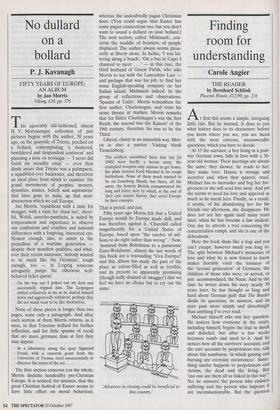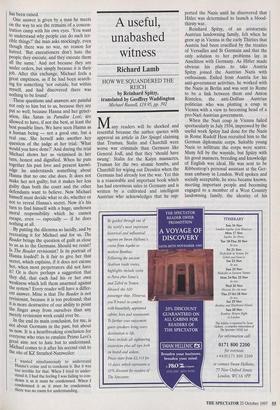Finding room for understanding
Carole Angier
THE READER by Bernhard Schlink Phoenix House, £12.99, pp. 216 At first this seems a simple, intriguing little tale. But be warned. It does to you what history does to its characters: before you know where you are, you are faced with the most extreme, unanswerable questions, which you have to decide.
At 15 the narrator, a boy living in a post- war German town, falls in love with a 36- year-old woman. Their meetings are always the same: they shower, he reads to • her, they make love. Hanna is strange and secretive and, when they quarrel, cruel. Michael has to surrender and beg her for- giveness or she will send him away. And yet she seems to need his love and approval as much as he needs hers. Finally, as a result, it seems, of his abandoning her for his friends one afternoon, she disappears. He does not see her again until many years later, when he has become a law student. One day he attends a trial concerning the concentration camps, and she is one of the defendants.
Here the book shuts like a trap and you can't escape, however much you long to. The split between Michael's memories of love and what he is now forced to know makes horribly vivid the torment of the 'second generation' of Germans, the children of those who were, or served, or just accommodated, the Nazis. And by the time he writes down his story nearly 30 years later, he has thought so long and hard about German guilt that The Reader distils its questions, its answers, and its pure pain more simply and disturbingly than anything I've ever read.
Michael himself asks one key question. He notices how everyone in the court, including himself, begins the trial in shock and disbelief, but after a few weeks becomes numb and used to it. And he notices how all the survivors' accounts, and the rare accounts by perpetrators too, talk about this numbness, 'in which gassing and burning are everyday occurrences'. Some- thing similar happens to perpetrators and victims, the dead and the living. But `can one see them all as linked in this way? No, he answers; the person who endures suffering and the person who imposes it are incommensurable. But the question has been raised.
One answer is given by a man he meets on the way to see the remains of a concen- tration camp with his own eyes. 'You want to understand why people can do such ter- rible things?' the man asks mockingly, even though there was no war, no reason for hatred. 'But executioners don't hate the people they execute, and they execute them all the same.' And not because they are under orders, but simply because it is their job. After this exchange, Michael feels a great emptiness, as if he had been search- ing for something 'not outside, but within myself, and had discovered there was nothing to be found'.
These questions and answers are painful not only to him but to us, because they are put so well; because Hanna and her gener- ation, like Satan in Paradise Lost, are allowed to have, if not the best, at least the best possible lines. We have seen Hanna as a human being — not a good one, but a real one. She herself asks another key question of the judge at her trial: 'What would you have done?' And during the trial Michael shows her as victimised in her turn, honest and dignified. When he puts together his past love and present knowl- edge he understands something about Hanna that no one else does. It does not make her not guilty; but it makes her less guilty than both the court and the other defendants want to believe. Now Michael himself must decide what to do, whether or not to reveal Hanna's secret. Now it's his turn to find himself with a huge, unchosen moral responsibility which he cannot escape, even — especially — if he does nothing at all.
By putting the dilemma so lucidly, and by recreating it for Michael and for us, The Reader brings the question of guilt as close to us as to the Germans. Should we resist? Is The Reader revisionist? Is its portrait of Hanna loaded? Is it fair to give her that secret, which explains, if it does not excuse her, when most perpetrators did not have it? Or is there perhaps a suggestion that they did, that each had his or her own weakness which left them unarmed against the system? Every reader will have a differ- ent answer. Mine is that The Reader is not !evisionist, because it is too profound; that it is more destructive of our ability to point the finger away from ourselves than any merely revisionist work could ever be.
In the end its main conclusion, for me, is not about Germans in the past, but about us now. It is a heartbreaking conclusion for everyone who tries to emulate Primo Levi's great aim: not to hate but to understand. Michael comes to it after his second visit to the site of KZ Struthof-Natzweiler: I wanted simultaneously to understand Hanna's crime and to condemn it. But it was too terrible for that. When I tried to under- stand it, I had the feeling I was failing to con- demn it as it must be condemned. When 1 condemned it as it must be condemned, there was no room for understanding.



















































































 Previous page
Previous page